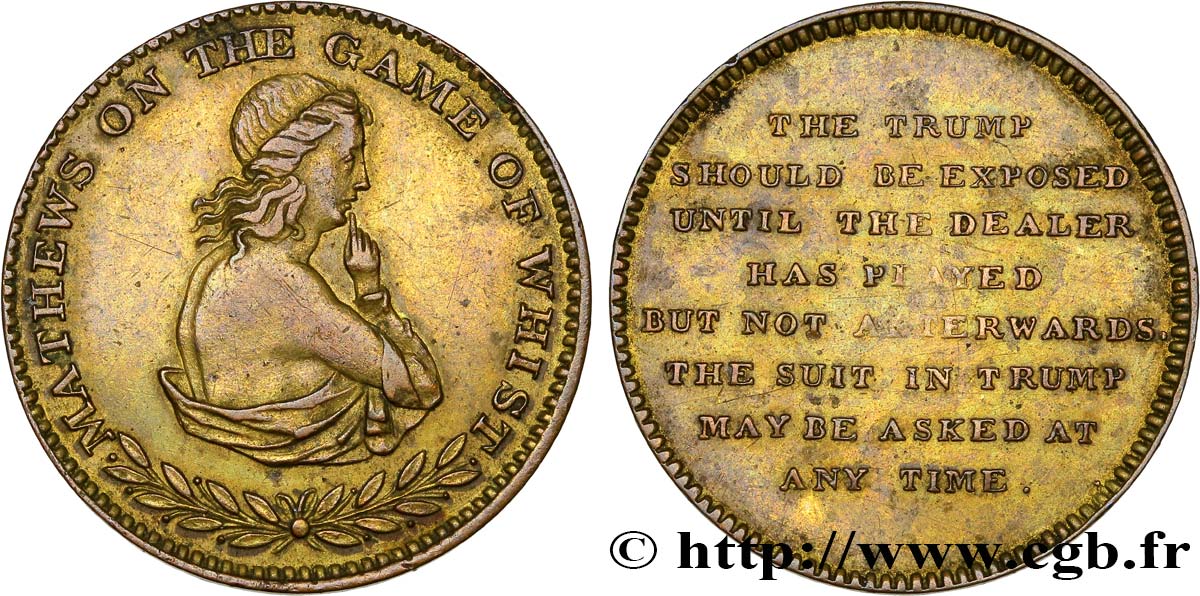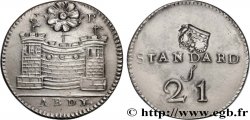E-auction 254-177949 - fme_370854 - ENGLAND - GEORGE III Médaille de jeu de Whist, par Thomason
You must signin and be an approved bidder to bid, LOGIN TO BID. Accounts are subject to approval and the approval process takes place within 48 hours. Do not wait until the day a sale closes to register. Clicking on « bid » constitutes acceptance of the terms of use of cgb.fr private e-auctions.
Bids must be placed in whole Euro amounts only. The sale will start closing at the time stated on the item description; any bids received at the site after the closing time will not be executed. Transmission times may vary and bids could be rejected if you wait until the last second. For further information ckeck the E-auctions F.A.Q.
NO BUYER'S FEE.
NO BUYER'S FEE.
| Estimate : | 50 € |
| Price : | 14 € |
| Maximum bid : | 14 € |
| End of the sale : | 26 February 2018 18:58:00 |
| bidders : | 6 bidders |
Type : Médaille de jeu de Whist, par Thomason
Date: 1818
Mint name / Town : UK
Metal : bronze
Diameter : 28,5 mm
Orientation dies : 12 h.
Weight : 6,5 g.
Edge : lisse
Coments on the condition:
Intéressante médaille ou jeton de jeu
Obverse
Obverse legend : MATHEWS ON THE GAME OF WHIST.
Obverse description : Figure du Silence regardant à droite ; légende autour.
Reverse
Reverse legend : THE TRIMP / SHOULD BE EXPOSED / UNTIL THE DEALER / HAS PLAYED / BUT NOT ANTEWARDS. / THE SUIT IN TRUMP / MAY BE ASKED AT / ANY TIME..
Reverse description : Légende horizontale en huit lignes.
Commentary
Le mot anglais whist signifie « silence ». Le jeu de whist fut inventé, en Angleterre, au XVIIIe siècle. Il comportait, parmi ses règles, une règle de silence : toute parole prononcée par l'un des joueurs était pénalisée. D'Angleterre, le jeu passa en France, vers la fin du règne de Louis XIV, et il y rencontra un très grand succès. Dans L'Homme aux quarante écus, le roman célèbre de Voltaire, l'auteur fait dire à son héros : « Mes voisins et mes voisines jouent après dîner un jeu anglais que j'ai beaucoup de peine à prononcer, car on l'appelle wisk ».
Au XIXe siècle, le whist connut une vogue véritablement internationale. C'est de cette époque que datent les premiers « traités » de whist comme les conseils rimés que rédigea, à l'occasion d'un congrès de joueurs de whist en 1851, le général Peretti.
Un grand nombre des expressions dont on se sert encore de nos jours, au bridge, sont nées avec le whist : appel, chelem, honneurs, robre, etc. Le whist a connu plusieurs variantes (whist simple, whist à la couleur, whist simple à deux ou trois joueurs, whist prussien, etc.).
Les sets utilisés pour le jeu de Whist étaient coposés de 24 médailles ou jetons avec un droit identique et des revers complémentaires à propos des règles du jeu.
Au XIXe siècle, le whist connut une vogue véritablement internationale. C'est de cette époque que datent les premiers « traités » de whist comme les conseils rimés que rédigea, à l'occasion d'un congrès de joueurs de whist en 1851, le général Peretti.
Un grand nombre des expressions dont on se sert encore de nos jours, au bridge, sont nées avec le whist : appel, chelem, honneurs, robre, etc. Le whist a connu plusieurs variantes (whist simple, whist à la couleur, whist simple à deux ou trois joueurs, whist prussien, etc.).
Les sets utilisés pour le jeu de Whist étaient coposés de 24 médailles ou jetons avec un droit identique et des revers complémentaires à propos des règles du jeu.








 Report a mistake
Report a mistake Print the page
Print the page Share my selection
Share my selection Ask a question
Ask a question Consign / sell
Consign / sell
 Full data
Full data